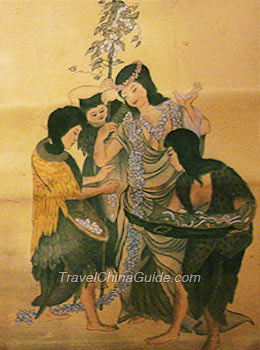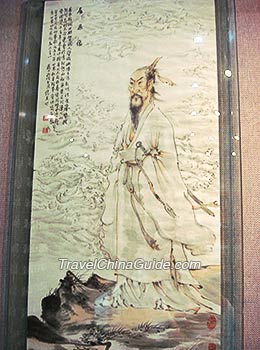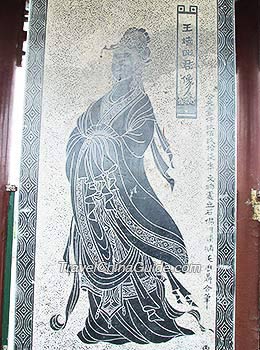Celebrities of Yangtze Area
 |
| Luozu, Inventor of Sericulture |
Luozu
- Wife of Huangdi (Yellow Emperor) and Mother of Chinese
Yichang, is a city along the Yangtze River, and known as Xiling in ancient times. Yichang is the place where Luozu was born. Luozu also called Leizu, was the wife of Huangdi (the Yellow Emperor) and the mother of the Chinese people.
Two sons named Xuan Xiao and Chang Yi were born to Luozu and Huangdi. The ancestors of Xia, Shang and Zhou Dynasties' emperors all have kinship with Luozu and Huangdi. So, Luozu is regarded as the mother of the Chinese people.
In the folk, Luozu means silkworm-raising mother (goddess of silkworm-raising) since the clever and hardworking Luozu taught the people how to raise silkworms and make silk. By doing this, the evolution of society was promoted greatly. She also tried her best to assist Huangdi to govern the county. At last, she died due to overtiredness.
As the hometown of Luozu, Yichang has a temple that was built on Xiling Mountain during the Ming Dynasty. Every year, on the fifth day of March on the Chinese lunar calendar, the temple fair is held to sacrifice to Luozu in the building, and a seminar is usually held on the mountain for professors to communicate the culture of Luozu.
Qu Yuan
- Great Patriotic Poet
 |
| Qu Yuan |
Please click for detailed information about Qu Yuan.
Qu Yuan Temple
Dragon-Boat Festival
Wang Zhaojun
- Contributor to Ethnic Relationship and One of the Chinese Four Ancient Beauties
Wang Zhaojun, also called Wang Qiang, was a beautiful girl who lived during Western Han Dynasty. Born in Baoping Village, a village on the upper reaches of Fragrant Stream (Xiangxi Stream) at the northern bank of Xiling Gorge's west mouth, Zhaojun was chosen to go to the palace when she was seventeen years old.
 |
| Wang Zhaojun |
At that time, the Emperor Yuan of Han Dynasty chose the beauties from the whole country. Zhaojun was chosen to wait for her personal selection by the emperor. As there were numerous maids in the palace, the emperor couldn't meet them all one by one to choose, so, he had an artist produce a picture of each maid and chose from the pictures. Some of the maids in order to be favored by emperor, bribed to the painter. Thus, some of them were portrayed more beautiful than they really were by the painter. As Zhaojun did nothing for the painter, she was portrayed very poorly. As a result she was not chosen by the emperor and had no chance to be summoned.
During this period, there were often battles between the Han Dynasty and the Huns (also Xiongnu, an ethnic minority). In 33 BC, the leader of Huns, Huhanye proposed the idea of settling the problem with a marriage policy. At that time, the relationship with the Huns was a major problem to the Han Palace, if the problem could be solved smoothly, the battle could be stopped and people could live peacefully. However, all the court ladies lived a comfortable life in the palace and no one wanted to leave the country and live the nomadic life with the Huns. At that time, in order to let the county have peace in the future, Wang Zhaojun volunteered to go and marry Huhanye. Although Emperor Yuan felt regret when he met Zhaojun the first time in the farewell party, he had no choice but to give her to Huhanye.
Thanks to the behavior of Wangzhaojun, the battle stopped and the people lived happy life after she married Huhanye. For thousands of years, her story has been passed from generation to generation and the people all show great respect to this heroine.![]() Further Reading: Zhaojun Tomb
Further Reading: Zhaojun Tomb